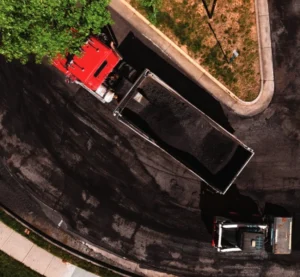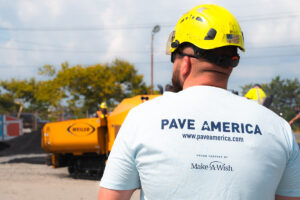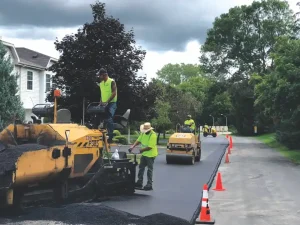When it comes to paving materials, many of us may not immediately think about their environmental impact. However, opting for eco-friendly options can make a significant difference in reducing carbon emissions and promoting sustainability. Here’s a brief overview of some eco-friendly paving materials that are increasing in popularity.
Permeable Paving
One such alternative is permeable paving. Permeable pavement is designed to allow rainwater to infiltrate through its surface, rather than running off into storm drains. This feature helps prevent flooding by reducing the amount of surface water runoff during heavy rainfall events. It also promotes groundwater recharge, which can help replenish local water sources.
This type of paving is typically made up of porous materials like pervious concrete or permeable asphalt, allowing water to pass through gaps or pores between the particles and be absorbed into the ground below. The materials used in permeable pavement are often selected for their ability to withstand heavy traffic loads while still maintaining permeability.
In addition to its stormwater management capabilities, permeable paving plays a role in improving water quality by filtering pollutants and sediments from runoff before they enter natural water bodies. This helps protect aquatic ecosystems and preserves the quality of our water resources.
Recycled Concrete Aggregate
Another eco-friendly option gaining popularity is recycled concrete aggregate (RCA). RCA involves reusing waste concrete from demolition sites or construction projects to create pavements. This not only helps reduce the amount of concrete ending up in landfills but also provides a sustainable and durable solution for pavement needs. By opting for RCA, we can significantly contribute to cutting down on landfill waste while still ensuring long-lasting roads, driveways, and sidewalks. Moreover, choosing RCA over traditional aggregates decreases the demand for mining new materials, thereby reducing the environmental impact associated with extraction processes.
Porous Asphalt
For those looking for a more natural aesthetic, porous asphalt might be the answer. Unlike traditional pavement, which prevents rainwater from being absorbed into the ground, porous asphalt contains tiny holes that allow water to pass through the surface and filter naturally into the soil below. The ability of porous asphalt to retain and filter rainwater offers numerous benefits for both the environment and people living in urban areas. By allowing water to seep into the ground instead of running off onto impermeable surfaces, this type of paving reduces stormwater runoff and helps replenish groundwater supplies. Furthermore, it helps prevent flooding by improving drainage during heavy rains. Moreover, porous asphalt has proven to be an effective tool for reducing noise pollution. The open structure of the material absorbs sound waves, making it an ideal choice for areas with high traffic or where quiet surroundings are desired.
In addition to its environmental advantages, this eco-friendly paving material also provides aesthetic appeal. The natural look and texture of porous asphalt blend seamlessly with surrounding landscapes, creating a more visually pleasing environment compared to standard paved surfaces.
Conclusion
By choosing environmentally friendly paving materials like permeable pavement, recycled concrete aggregate (RCA), or porous asphalt, we can contribute towards building a greener future while still meeting our infrastructure needs. It’s crucial to remember that even seemingly minor choices can have a significant impact in preserving our environment for generations to come.
Contact the Experts at Pro-Pave for All Your Paving Needs
The experts at Pro-Pave are specially trained to provide the very best in quality paving for your home or business. Our process is efficient, ensuring that we minimize disruptions to your everyday life while ensuring the safety of those on or near the job site.
If you have a new paving project, don’t wait – contact our team at (703) 433-9500 or fill out our online contact us form to get a free quote or evaluation!



